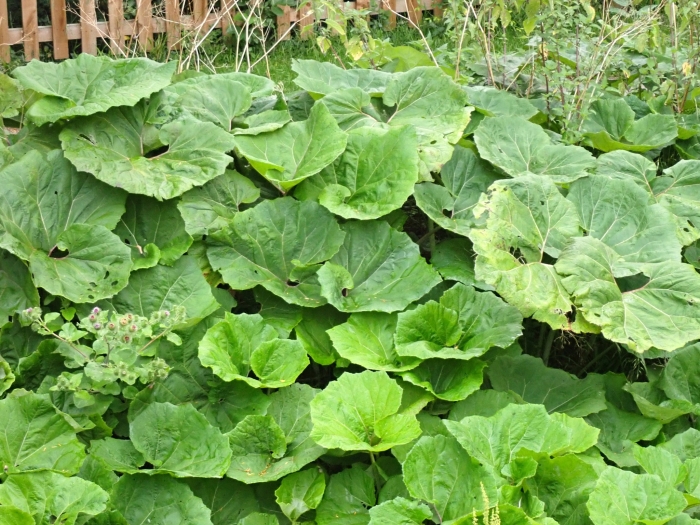Butterbur
(Petasites japonicus)
Butterbur (Petasites japonicus)
/
/

© Jerry Lanfear
CC BY 4.0
Image By:
© Jerry Lanfear
Recorded By:
Copyright:
CC BY 4.0
Copyright Notice:
Photo by: © Jerry Lanfear | License Type: CC BY 4.0 | License URL: http://creativecommons.org/licenses/by/4.0/ | Uploader: jerry2018 | Publisher: iNaturalist |

























Estimated Native Range
Summary
Petasites japonicus, commonly known as butterbur, is a perennial herb native to riverbanks, wetlands, and moist forested areas in East Asia. It has been introduced to Europe and North America, where it often grows in similar moist habitats. This plant is particularly noted for its large, broad leaves that can reach up to 32 inches (80 cm) in width, providing a bold textural element in the garden. The flowers are dioecious, meaning male and female flowers are on separate plants, and they appear before the leaves in early spring. The flower spikes are not particularly showy, with the male flowers being pinkish-purple and the female flowers greenish-white.
Butterbur is valued for its rapid growth and large leaves, which can create a dramatic ground cover in wet areas of the garden. It is also used in traditional Japanese cuisine, where the young leaves are often pickled, and in medicine for its purported health benefits. However, gardeners should be cautious as all parts of the plant contain toxic pyrrolizidine alkaloids, which can be harmful if ingested in large quantities. Cultivation requires consistently moist soil, and it thrives in full to partial shade. While it can be a useful plant in the right conditions, Petasites japonicus has the potential to become invasive, spreading aggressively by rhizomes. It is important to monitor its growth and manage its spread to prevent it from overtaking other plantings.CC BY-SA 4.0
Butterbur is valued for its rapid growth and large leaves, which can create a dramatic ground cover in wet areas of the garden. It is also used in traditional Japanese cuisine, where the young leaves are often pickled, and in medicine for its purported health benefits. However, gardeners should be cautious as all parts of the plant contain toxic pyrrolizidine alkaloids, which can be harmful if ingested in large quantities. Cultivation requires consistently moist soil, and it thrives in full to partial shade. While it can be a useful plant in the right conditions, Petasites japonicus has the potential to become invasive, spreading aggressively by rhizomes. It is important to monitor its growth and manage its spread to prevent it from overtaking other plantings.CC BY-SA 4.0
Plant Description
- Plant Type: Herb
- Height: 2-3 feet
- Width: 3-5 feet
- Growth Rate: Moderate, Rapid
- Flower Color: Pink, White
- Flowering Season: Spring, Summer
- Leaf Retention: Deciduous
Growth Requirements
- Sun: Part Shade, Full Shade
- Water: Medium
- Drainage: Medium
Common Uses
Border Plant, Edible*Disclaimer: Easyscape's listed plant edibility is for informational use. Always verify the safety and proper identification of any plant before consumption., Low Maintenance, Potted Plant, Water Garden
Natural Habitat
Native to riverbanks, wetlands, and moist forested areas in East Asia
Other Names
Common Names: Japanese butterbur, Fuki, Giant Butterbur, Great Butterbur, Japanese Sweet Coltsfoot
Scientific Names: , Petasites japonicus, Nardosmia japonica subsp. japonica, Petasites japonicus f. japonicus, Petasites japonicus var. japonicus, Tussilago petasites,
GBIF Accepted Name: